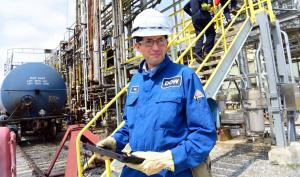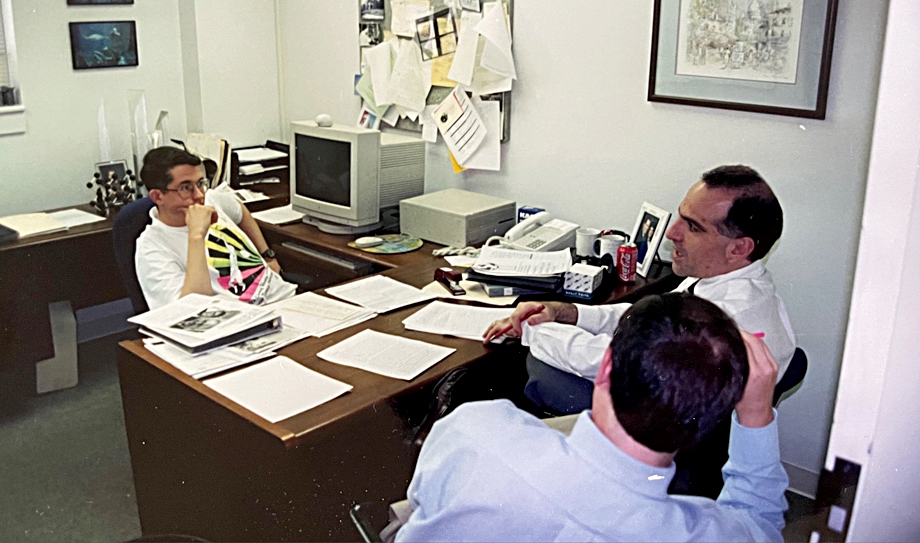
Editor’s Note: The American Institute of Chemical Engineers announced Nov. 8 that Billy Bardin will become president-elect in 2022, and will succeed current president-elect Christine S. Grant of North Carolina State University as president in 2023.
Billy B. Bardin — a 2000 graduate of the University of Virginia’s chemical engineering Ph.D. program and 2011 recipient of the UVA School of Engineering and Applied Science’s Outstanding Young Engineering Graduate Award — has been nominated as a candidate for president of the American Institute of Chemical Engineers. If elected, he would become president-elect in 2022 and president in 2023.
Bardin, a fellow and life member of the institute, has an extensive AIChE biography that includes numerous leadership roles across the organization. He has been just as active in UVA’s Department of Chemical Engineering, dating back to his student days when he was a founding member of the Chemical Engineering Graduate Board — a role he takes pride in, including as the primary author of the original bylaws.
“It’s great to see the board has become a highly valued part of the departmental community, helping with recruiting, faculty candidate searches and meeting with the industrial advisory board when we visit,” said Bardin, who has served on the department’s advisory board for more than a decade.
Bardin, the global digitalization director at Dow, and his teams also have performed joint research with his former UVA advisor, William Mynn Thornton Professor Robert J. Davis, a noted catalysis expert.
Davis’ industry relationships helped Bardin launch his career at Dow. Bardin subsequently rose through leadership roles in research, development and manufacturing, including tenures as the research and development director for the feedstocks, hydrocarbons, chemicals and licensing global business units and the global operations technology director for all of Dow’s manufacturing facilities.
From his roots in the small North Carolina town of Stantonsburg, Bardin has since lived around the world, including in Switzerland, the Netherlands and several U.S. states. He has received numerous academic and professional awards, including UVA’s Chemical Engineering Faculty Award for Excellence in Doctoral Study. And he was recognized this year as a Visionary Digital Leader by the National Association of Manufacturers’ Manufacturing Leadership Council.
In a recent interview, Bardin spoke about his work at Dow, his UVA experiences past and present, and his dedication to service.
What does it mean to be Dow’s global digitalization director?
It means implementing digital capabilities in our manufacturing facilities and across our organization to become more productive, safer, more reliable and more capable of addressing our sustainability goals. Capabilities can be anything from using sophisticated modeling techniques to speed up lab experimentation to engineers using mobile devices in the field. Digitalization is about turning data, often collected in real time, into actionable decisions, combined with technologies that go into these concepts, such as automation and machine learning. You might hear all these things, taken together, referred to as Industry 4.0, which is a reference to the next phase of the Industrial Revolution.
How is digitalization changing how chemical engineers do their jobs?
I see the seamless connectivity of data, which some call the digital thread, transforming how chemical engineers design and construct plants, how they run and maintain the facilities, and how they interact with processes.
Historically, research and development, engineering, maintenance and process data were contained in disparate and disconnected systems. In digitalized data architecture, all of these data are connected and available in a seamless manner to the users when and where they need them. While understanding fundamental chemical engineering principles will always be critical, engineers will use many more connected tools in the field such as tablets and mobile collaboration devices. Chemical engineers will need to be proficient using connected data systems and more knowledgeable about the information technology systems that support this data architecture.
Just as chemical engineers a few decades ago had to learn the ins and outs of distributed control systems and computer control, today’s chemical engineers need these new skills to be competitive. These changes are one of the reasons I have been advocating for the inclusion of more data science skills in the chemical engineering curriculum.
How did your UVA experience influence your career, and what lessons did you learn at UVA that have helped you?
I began as a senior engineer at Dow doing exactly the hardcore chemical engineering work for which I was trained.
One of the best characteristics of UVA and chemical engineering is the familial atmosphere in which the students, faculty and staff work and learn. Like many UVA alumni, I built lifelong relationships that guide my career to this day. The research skills that I learned in professor Bob Davis’ group, in close collaboration with former professor Matt Neurock, helped me make an immediate impact in several areas when I joined Dow.
UVA also taught me how to be an empathic servant leader and how to build a collaborative team — both critical skills. My passion for helping those with less experience started at UVA through supervising undergraduate research and being a teaching assistant. In fact, I have a Dow colleague who was a student I taught as a graduate teaching assistant while at UVA! I always look forward to returning to Grounds to see longtime friends and to see what new research is happening. My UVA education has not stopped. Every time I return, I learn something and enjoy being back in that welcoming, familiar atmosphere.

What do you see in the department today that makes you optimistic for today’s and future students?
We’ve got a great group of new faculty who are bringing different perspectives to the department, opening new research areas. One thing I always liked about UVA is a real focus on teaching, whether it’s graduate students or undergraduates, and you see that in the faculty. There’s a nice mix of balancing research objectives with teaching responsibilities in the Jeffersonian tradition.
Why is it important to you to stay so involved in the department?
UVA, and specifically the Department of Chemical Engineering, has had a huge impact on my career and my life. I go back to see friends and colleagues. But it is more important as chemical engineering professionals to ensure the success of forthcoming generations, and one way to do that is to engage with universities.
Why is the American Institute of Chemical Engineers important to you?
I became involved in AIChE as an undergraduate student and joined the national organization as a graduate student member in 1995, the summer before starting graduate school at UVA. My first significant interactions with the institute centered on the technical community in the Catalysis and Reaction Engineering Division — presenting research results, building networks of colleagues in catalysis, learning new techniques and information from meetings, conferences and publications. I was fortunate to have an opportunity to take a leadership position in the division, and from there I was able to engage in many different parts of AIChE, learning much more about what the institute offers.
AIChE supports a number of causes about which I am passionate. The institute provides a forum for the continuing development and education of our chemical engineering community and seeks to bring more people into the profession. The organization strives to give students at all levels opportunities to grow and explore careers in our profession. The institute also works to accelerate our technology advancement around the world.
Why do you want to lead the American Institute of Chemical Engineers as president?
We have lots of challenges for our society and profession. I think we can have great impact on society and drive our profession to deliver new innovations, making the lives of many people around the world better. Chemical engineers have the capability and the responsibility to help address these challenges.
What takeaway messages do you have, especially for UVA students and young alumni, about what memberships in professional societies have to offer, both individually and societally?
For me, AIChE has been a great conduit to building a professional network, making new friends throughout my career, continuing to learn and grow, and helping me to have an impact on issues of interest to me. If students and new professionals look to what is important to them and their goals, professional societies will have something to offer to help them achieve those goals.
Finally, I believe it is important to leave a strong legacy of improving our society and bettering our profession as we move through our professional and personal lives. As the home for chemical engineers, AIChE is one place where these objectives have been realized for me.